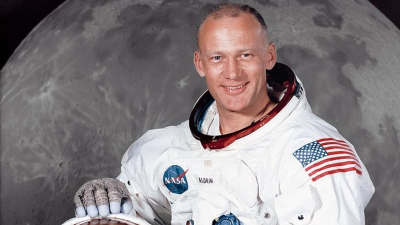
In the hindi movie Three Idiots, remade in tamil as nanban, a character remarks that the world only remembers those who come first. He says nobody knows the name of the second person to land on the moon, because he is not important. This cannot be farther from the truth. In fact, the person who landed second on the moon in the celebrated hero and, in some accounts, a controversial figure. Interestingly, he was the first person to do something unique in space. Can you name him?
Answer. “Buzz” Aldrin third from left in the above picture, is an American hero, who has made three spacewalks. A Presbyterian elder (elected member of the crurch), Aldrin was the first person to hold a religious ceremony on the moon when he privately took communion. Before he headed into space in 1969, He got special permission to take bread and wine with him to space and give himself communion. He has been accorded numerous honours, including the presidential Medal of Freedom in 1969. Rumours were rife in 2020 that buzz had reported to NASA that he saw aliens on his way to the moon. It was later proven to be false.
In the 1950s, when racial segregation of white and black communities was the norm in the U.S., it was illegal for a black person to sit next to a white person. If a white person had no seat, black passengers had to vacate their seat and offer it. In 1955, one lone black woman passenger refused to abide by this irrational norm. She refused to stand up and offer her seat to a white person, triggering a massive protest that culminated in the U.S. civil rights movement. Can you name this person?
Answer: Rosa Parks was an American civil rights activist who played a crucial role in the Montgomery bus boycott movement. Her actions inspired the local black community in Alabama to organise the movement, which was led by a young Dr. Martin Luther King Jr. Though Parks lost her job as a consequence of her dissent, the U.S. Supreme Court, finally, ruled that bus segregation was unconstitutional. In 1999, Parks was awarded the Congressional Gold Medal, the highest honour the United States bestows on a civilian. Dr. King, of course, went on to become an American hero.
He was nicknamed “Africa’s Che Guevara” for his stance on the West and his fierce anti-colonialist ideology. A military leader, he changed his country’s name from the colonial Upper Volta to Burkina Faso – “the land of honest men”. He initiated several progressive reforms in his country, from promoting vaccinations for babies to banning the horrendous practice of female genital mutilation, and improving access to education. Can you name him?
Answer: Thomas Sankara was a Marxist leader who came to power in 1983 following a leftist coup that overthrew the moderate military faction ruling Burkina Faso. Much like Che Guevara, this frugal-living, motorcycle-riding, guitar-playing leader became a symbol of hope and resistance throughout Africa.
Once, when a reporter asked him why he did not want his pictures hung in public places, he famously said, “because there are seven million Thomas Sankaras here”. A proponent of Pan-Africanism, he was murdered just within four years of coming to power. Sankarism, currently, is a popular political trend in Africa. They believe his murder was orchestrated by imperialist forces.
Bangabandhu, as he is fondly referred to, was a revolutionary who fought for the liberation of East Pakistan. He was the founder of Bangladesh and served as its President and Prime Minister until he and his family were assassinated in 1975. Only two of his daughters, who were abroad at the time, escaped the attack. One of them, Sheikh Hasina, is currently the Prime Minister of Bangladesh. Can you name this leader?
Answer: Sheikh Mujibur Rahman was a socialist revolutionary who was among the leaders of the freedom movement in Bangladesh. Though the leader of a Muslim majority country, Mujib, as he was known among his friends and followers, aspired to build a sovereign and secular country. “First I am a human being, then a Bengali, and after that a Muslim,” he had once famously remarked. Mujib admired Nobel Laureate Rabindranath Tagore’s view that humanism is always greater than nationalism. Many believe his assassination to be linked with his progressive push to develop Bangladesh as a liberal nation. With the assassination of Mujib, Bangladesh slipped into political regression. Secular values of the State degraded gradually and Islam was declared as the State religion in 1988. Persecution of religious minorities became rampant.
Picture Credit : google

